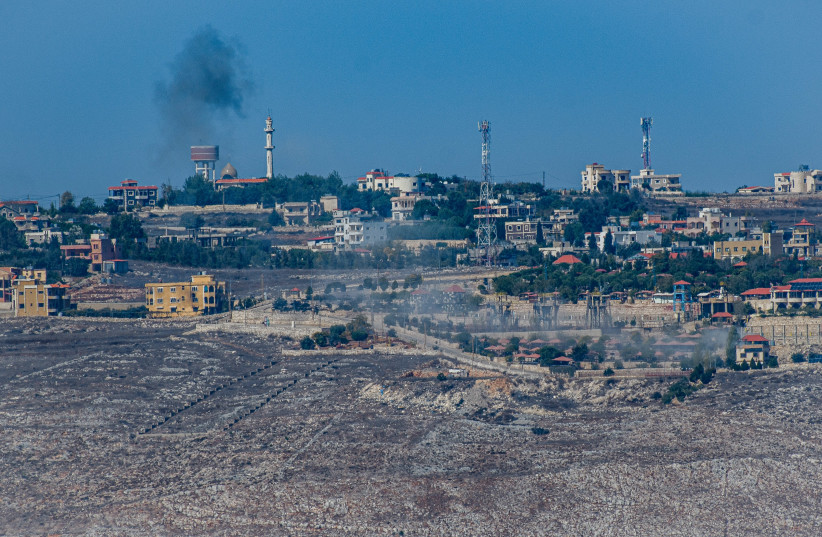It is time for the world to stand up to Hezbollah – editorial
Hezbollah’s recent surge in threats against Israel has reached an unprecedented pace, with Sunday standing out as one of the worst days since October 7 in terms of Israelis wounded. This heightened level of violence is particularly alarming, with both soldiers and civilians falling victim to attacks in the North.
The significance of these events lies not only in the toll they take but in the clear message they convey: Hezbollah remains undeterred, confident in its ability to strike Israel at will, choosing both the time and place for its attacks. To exacerbate matters, Hezbollah has broadened its strategy by enlisting other Iranian-backed proxies, notably empowering Hamas to launch assaults from Lebanon, thereby elevating the specter of a two-front war.
Israel’s immediate and primary objective is to concentrate efforts on defeating Hamas in Gaza. The urgency stems from the devastating massacre orchestrated by Hamas on October 7, which resulted in the death of some 1,200 people and 239 held hostage. The imperative is clear: Israel must decisively defeat Hamas and dismantle its terrorist infrastructure in Gaza, and this remains the central focus without succumbing to distractions.
However, Hezbollah’s attacks are not merely a distraction. The toll is felt beyond the immediate battleground, with more than 40 communities and a city in northern Israel forced to evacuate. The displaced residents now find themselves in hotels and guest houses, their lives dramatically upended, with makeshift study areas becoming the norm for schoolchildren.
This upheaval is not lost on Iran, Hezbollah, and its various tentacles. Their aim is to sow uncertainty and make life in the affected regions increasingly difficult. The broader narrative being crafted suggests that the conflict in Gaza is part of a more extensive regional war against both Israel and the United States.

Nasrallah hinted at a dangerous escalation over the weekend
Hezbollah’s leader, Hassan Nasrallah, hinted at a dangerous escalation over the weekend, implying that if the war in Gaza persists, so, too, will threats against the US. This hints at a coordinated effort to drag Israel into multiple fronts and “arenas,” providing Hamas with exploitable opportunities.
Hezbollah’s attempts to dictate Israel’s next moves are evident in the specifics of its recent attacks. On a recent Sunday, the group fired an anti-tank missile at the community of Dovev, causing harm to civilians. In response, the IDF struck a terrorist cell embedded in a civilian area in Lebanon. Hezbollah further intensified its assaults, resulting in injuries to Israeli soldiers.
The group employs a variety of means, including drones and rockets, prompting consistent retaliation from Israel. For instance, following sirens in the area of Granot Hagalil in the North, the IDF identified two mortar launches. The launches, fortunately, fell harmlessly in open areas, prompting IDF artillery to strike the sources.
Nevertheless, Hezbollah’s onslaught persists. An attack on the border community of Arab al-Aramshe, a Bedouin community in the North, involved the use of mortars, further heightening the tension. The situation is precarious, with Hezbollah unequivocally responsible for escalating crimes. This state of affairs cannot be allowed to continue indefinitely.
The protracted nature of the war in Gaza, potentially spanning years, underscores the need to live with this persistent challenge. Adding multiple fronts, especially in the North, introduces additional complexities. Deterring Hezbollah assumes paramount importance, coupled with a resolute message that these attacks will not go unanswered.
Israel has employed a variety of means, including proportional responses, but the time has come to rally the international community to its side. United Nations resolutions mandating Hezbollah to abstain from attacking and stockpiling weapons should be reinforced globally. For too long, the international community has watched groups such as Hamas and Hezbollah morph into terrorist armies effectively controlling states, a situation that is unacceptable.
The imperative now is to seek stability in the region. This involves active engagement with allies to convey that the current situation will not be tolerated. The potential for a dangerous escalation, as hinted at by Hezbollah, necessitates a united front. The international community must stand firm and ensure that the terrorist group knows the current situation will not be tolerated.





Comments are closed.